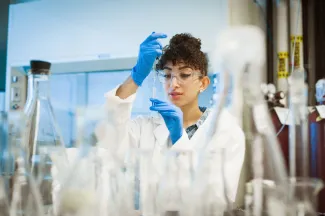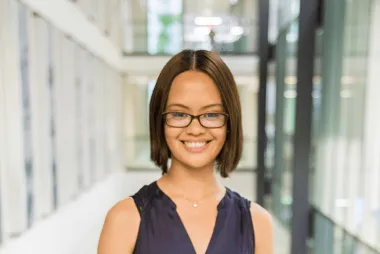"If you are willing to work hard and you manage your time well, you can succeed in engineering."

Mikah L’Ecuyer Morison
- Degree:
- Bachelor of Applied Science
- Program:
- Campus: Vancouver
- Year: Third year as of October 2023
Why did you want to study engineering?
I’ve always been aware of environmental issues, and I saw engineering as a way to work for positive change and sustainability. I also enjoyed studying chemistry and biology in high school, and I liked the hands-on nature of engineering compared to other majors that are more research based.
Chemical and Biological Engineering
How did you choose Chemical and Biological Engineering?
You have so many job options open to you as a chemical and biological engineer. That appealed to me.
Tell us about your co-op experience.
I think co-op is essential if you are planning to work as an engineer after you graduate, rather than going on to do a master’s degree or PhD.
Most employers are more interested in your work experience than your grades, and co-op is an easy way to get that experience. For my first co-op, I worked for eight months at a research lab at UBC doing a scale-up of microbial fuel cells. It was an amazing learning opportunity that helped me realize the importance of what we’re learning in our courses. My supervisor, who had also been a TA for some of my courses, pushed me to gain new skills, like doing 3D modelling using Fusion and learning Python for data analysis.
I’m a few months into my second co-op term at Nano One Materials, a company that produces cathode powders used in lithium-ion batteries. I’m part of the lab team doing small-scale experiments on material characterizations.
The engineering program is a lot of work and your day rarely ends at five o’clock. But in co-op, your have regular hours and your time is your own at night and on weekends. And of course, you’re getting paid to learn skills that you would want to learn anyways.
Tell us about your work with Innovation OnBoard.
I feel like if you’re an engineer, there are two paths ahead of you. One is working for a salary and the other is launching a startup. Innovation OnBoard was started in 2017 to help students develop their entrepreneurial abilities. It wound down for a few years because of Covid, and I’ve been part of the efforts to restart it. Students form teams and work with mentors in their field through about eight seminars each year. We then host a Dragon’s Den-style competition where each team delivers their pitch, with the winning team getting $5000 and second and third places receiving $3000 and $2000 to use towards their ventures. There are lots of other benefits provide by partners and sponsors other than cash prizes as well.



